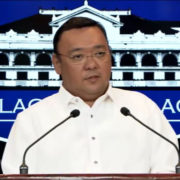The Philippines is not abandoning its traditional alliance with the United States, Malacañang said on Monday, May 21.
Leading the Filipino delegation was Executive Secretary Salvador Medialdea, who met U.S. Admiral Harry Harris Jr., chief of the U.S. Pacific Command (Pacom), in Honolulu, Hawaii on Friday, May 18.
Malacañang said the meeting between Philippine officials and the United States Pacific Command (PACOM) chief was meant to reassure that the Philippines has not abandoned its ties with the U.S.
Apart from Medialdea, Foreign Secretary Alan Peter Cayetano, Defense Secretary Delfin Lorenzana, Interior and Local Government officer-in-charge Eduardo Año, Philippine Ambassador to the United States Jose Manuel Romualdez and Philippine Permanent Representative to the United Nations Teodoro Locsin Jr. joined the meeting.
According to the Department of Foreign Affairs (DFA), the two allied countries renewed their commitment to strengthen ties.
“The Philippines and the United States have reaffirmed their resolve to bolster their enduring alliance anchored on common values and interest, historic ties, and the Mutual Defense Treaty, in high-level discussions in Honolulu,” the DFA said in a statement.
“The Philippine delegation had a very substantive exchange with Admiral Harris on regional challenges and both sides agreed that the alliance remains consequential to the preservation of regional stability and development,” it added.
The meeting came on the same day China deployed long-range bombers in the disputed South China Sea (West Philippine Sea), but Presidential spokesman Harry Roque Jr. said the meeting was not intended to discuss the situation in the disputed region.
“Well I can only surmise that the visit is intended to reassure the United States that, while we are pursuing an independent foreign policy, we have not actually – we have not abandoned our traditional ally, the United States,” Roque said in a Palace briefing.
“That is probably to reassure that we value the continued friendship, and the security cooperation that we have had with the United States through the years,” he added.
Since assuming the presidency, President Rodrigo Duterte has been seeking closer ties to China and Russia while unleashing several tirades against the U.S. He once threatened to sever ties with the superpower and end joint military training for its criticisms of his war on drugs.
Relations between Manila and Washington only eased when Donald Trump assumed the U.S. presidency in November 2016.
When Duterte was asked if the Philippines could employ its alliance with the U.S. to address the situation in the West Philippine Sea, he answered, “In the absence of an actual attack, the Mutual Defense Treaty [between Washington and Manila] is inapplicable.”
“It’s because what we need there is an actual armed attack on the Philippine territory or any of the islands. The military build-up by China cannot be the basis,” he said.
Duterte has maintained a soft stance on the Philippines’ maritime dispute with China since assuming office in 2016.






